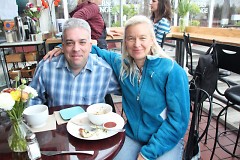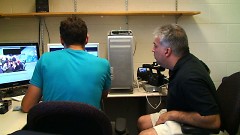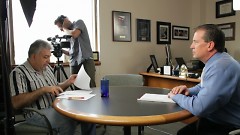What is philanthropy? It's a deceptively complicated question, but one that Salvatore Alaimo, a Grand Valley professor of public, nonprofit and health administration, sets out to answer. His upcoming documentary “What is Philanthropy?” will explore the concept of giving and its place in our culture.
The project began in the fall of 2008 when Alaimo was becoming frustrated explaining his field at social gatherings. Alaimo had worked in the nonprofit sector for nearly a decade at that point and was finishing his Ph.D. in philanthropic studies at Indiana University.
“When you do the typical ‘So, what do you do?’ It’s not like I can say 'well I'm a plumber' or 'I'm a carpenter' and you get it. Well, I work with this thing called philanthropy. A lot of people didn't seem to really get the concept,” Alaimo says.
This surprises Alaimo because nearly every citizen of the United States has been either a giver or a receiver of philanthropy at some point in his or her life. He wants to spread awareness and understanding of a concept that plays such an important role in society.
“There's no point in writing a book, because only the people who know philanthropy are going to read the book. No one else is going to read it,” Alaimo says. “But if there's a visual medium, it might enhance their understanding of this concept of philanthropy and what its role in society is. It might be a good educational tool.”
Alaimo wants to “bust” certain myths with his film. He wants to dispel the notion that philanthropy is just for rich people. Philanthropy is not limited to the wealthy, nor is it limited to financial giving, says Alaimo.
He says that philanthropy exists because not all of society’s needs are met through businesses and government. Tax money theoretically goes towards services for which there’s a general consensus of support, such as police and schools. This means public funding tends to stay away from things like symphonies or food pantries, he says. These are niches of need that fall through the gaps, and Alaimo says that philanthropy fills those needs.
A wide range of givers and volunteers from across the country appear on Alaimo's film to discuss their experiences with philanthropy. Interviewees include Grand Rapids students doing the 30 Hour Famine Project, NFL quarterback Alex Smith who started a foundation for foster teens, a retired Air Force pilot who takes critically ill children on plane rides and women who lost their pre-born children but supply breast milk for mothers who cannot lactate.
Those are just a few of the philanthropists in the film who will discuss their experience with giving. But alongside the heartwarming stories, Alaimo wants his film to be a critical analysis of the philanthropic world. He includes some of the fiercest critics of philanthropy in the documentary.
“If we were to have nothing but the warm and fuzzy stories, that's an insult to the intelligence of any student that's in a classroom thinking that all is well in world of philanthropy," says Alaimo. "Well, it's not. It's not perfect. It's run by people. People are fallible.”
Robert D. Lupton and Dan Pallotta, the authors of "Toxic Charity" and "Uncharitable" respectively, are critics who appear in the film. It was important to Alaimo to include these dissenters and give viewers a fuller picture of the philanthropic world. Some of the details are sure to shock people.
“Does the average citizen understand that the majority of philanthropic dollars do not go to the poor and most needy? They never have, and they probably never will. The percentage is actually very low,” Alaimo says. “Does the average citizen understand that most nonprofits do not subsist on donations alone? They’d all go out of business.”
“What is Philanthropy?” currently has no release date, but Alaimo says that he’s forcing himself to finish it this year. Nearly all the footage has been shot and the editing process is underway. The only hurtle left is a financial one. Alaimo needs $30,000 more to finish the film. It has been a longstanding challenge for the crew to come up with the funds for its ambitious project. Over the past five years, Alaimo has funded the project mostly out of pocket.
“I'm the largest donor with $55,000 of my own money,” Alaimo says. “The next highest donor is a family foundation with $10,000. So I am by far the largest donor, and I've made it clear to the foundation world that if they want to take that title away from me anytime and be the largest funder, I'm happy to relinquish it.”
“What is Philanthropy?” has received very little support from the philanthropic world. It's an unfortunate irony, at the point of being a “cruel joke,” in Alaimo's opinion. He understands that traditional foundations should be more concerned with programs that serve basic needs in an economic downturn, but even documentary funds have snubbed him because they don’t view philanthropy as a “social issue.”
Alaimo recounted a particular rejection from the Ford Foundation’s documentary fund, which gives away $50 million per year for documentaries.
“When they said no to me, they said 'We only fund films about social justice.' And I said, 'are you not making the connection? One of the big reasons philanthropy exists is for reasons of social justice.' He couldn't get it,” says Alaimo.
Alaimo also has a theory that some people in the philanthropic world don’t want the curtain pulled back. Foundations enjoy a lot of privacy. They’re tax-exempt and account for a high percentage of giving, he says, but not a lot of people understand what they do. Alaimo argues we have the right to know.
Despite funding challenges, Alaimo is committed to finishing the documentary this year. The plan is to release the film in various formats, including a 90-minute version for film festivals and public venues, a 58-minute version for DVDs and public broadcast, and a series of short web-based clips to be used as learning tools for teachers and students of philanthropy. He’s received many requests for the finished product from schools, libraries and even foundations. The Robert Wood Johnson Foundation is interested in integrating the film into their new employee training.
“I've never let the lack of money stop me from keeping the train going down the tracks,” Alaimo says.
Donations are tax-exempt and received through Grand Valley State University. Alaimo expresses his gratitude for anyone who can help him to finish this five-year project.
The Rapidian, a program of the 501(c)3 nonprofit Community Media Center, relies on the community’s support to help cover the cost of training reporters and publishing content.
We need your help.
If each of our readers and content creators who values this community platform help support its creation and maintenance, The Rapidian can continue to educate and facilitate a conversation around issues for years to come.
Please support The Rapidian and make a contribution today.


